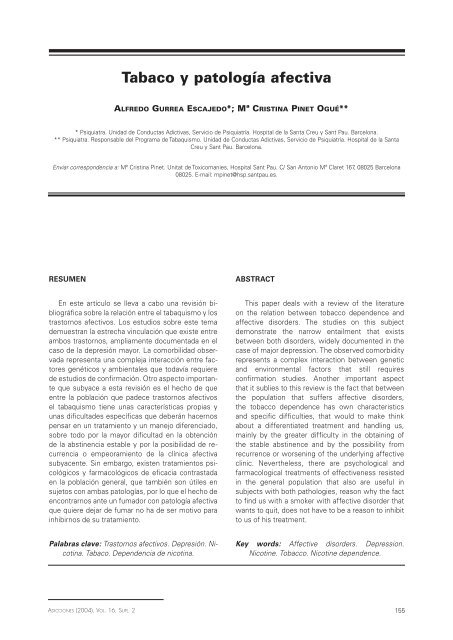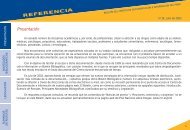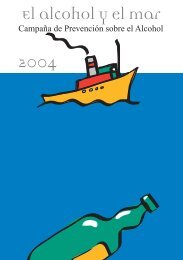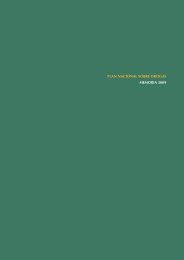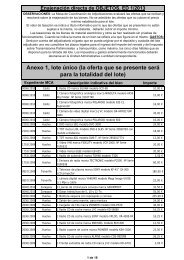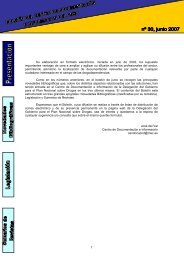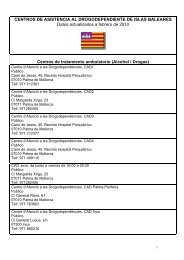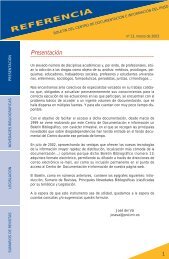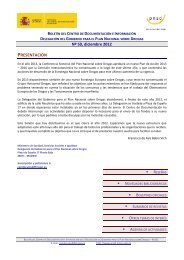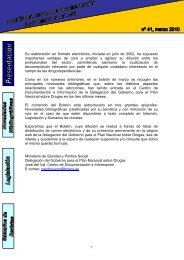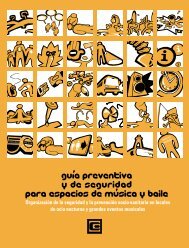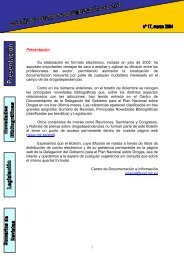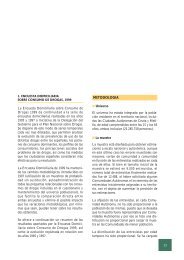- Page 1 and 2:
MONOGRAFÍA TABACO ISSN 0214-4840 a
- Page 3 and 4:
Los artículos de este número mono
- Page 5 and 6:
9. BENEFICIOS DE DEJAR DE FUMAR Ben
- Page 8 and 9:
Introducción ELISARDO BECOÑA Edit
- Page 10 and 11:
Tabla 1. Recursos más importantes
- Page 12:
los distintos abordajes terapéutic
- Page 15 and 16:
INTRODUCCIÓN El Tabaco puede descr
- Page 17 and 18:
una autentica panacea que servía p
- Page 19 and 20:
convertirse en el ingrediente princ
- Page 21 and 22:
En 1944 se creó Tabacalera S.A. qu
- Page 23 and 24:
nes en la venta y uso del tabaco...
- Page 25 and 26:
hacia África, Asia y el extremo Or
- Page 27 and 28:
como a la exposición al Aire Conta
- Page 29 and 30:
ficios económicos aportados por la
- Page 31 and 32:
A pesar de su integración en la UE
- Page 33 and 34:
para conseguir vender lo invendible
- Page 35 and 36:
que sigue, resume hasta dónde hemo
- Page 37 and 38:
nes y servicios. Contiene medidas l
- Page 39 and 40:
te insuficientes. Por ello, en lo r
- Page 41 and 42:
últimos años, debido a la necesid
- Page 43 and 44:
El mismo estudio señala que la evo
- Page 45 and 46:
el incremento de impuestos y la sup
- Page 47 and 48:
Control del contrabando. El contrab
- Page 49 and 50:
World Health Organization Regional
- Page 51 and 52:
Coste-efectividad de una política
- Page 53 and 54:
tratamiento del tabaquismo; y estra
- Page 55 and 56:
prioritario por las autoridades san
- Page 57 and 58:
A., Fernández. E., García, M., Sc
- Page 59 and 60:
Schiffiano, A., Fernández, E., Bor
- Page 61 and 62:
INTRODUCCIÓN El tabaquismo es uno
- Page 63 and 64:
Las preguntas relacionadas con el h
- Page 65 and 66:
Tabla 4. Hábito tabáquico y preva
- Page 67 and 68:
La edad de inicio en el consumo El
- Page 69 and 70:
Tabla 12. Consumo actual de tabaco
- Page 71 and 72:
ción a lo largo de los años (John
- Page 73 and 74:
presenta una correlación clara con
- Page 76 and 77:
Impacto del tabaquismo sobre la mor
- Page 78 and 79:
En Europa occidental el tabaquismo
- Page 80 and 81:
donde p 0 es la prevalencia de nunc
- Page 82 and 83:
úbricas de ambas revisiones casi s
- Page 84 and 85:
El fumador pasivo LEOPOLDO SÁNCHEZ
- Page 86 and 87:
Componentes. La combustión del tab
- Page 88 and 89:
diámetro de medio milímetro y ter
- Page 90 and 91:
cotinina en orina se encuentra sign
- Page 92 and 93:
es sin otro riesgo de nacimiento pr
- Page 94 and 95:
Efectos del HTA en la infancia La l
- Page 96 and 97:
37% frente a 46% según sus padres
- Page 98 and 99:
mación sobre la etiología de cier
- Page 100:
old children of smo king parents.-
- Page 103 and 104:
también devastadores si se analiza
- Page 105 and 106: Andalucía que recientemente ha ent
- Page 107 and 108: Tabla 1. Componentes del humo de ta
- Page 109 and 110: mina D la proteína p53 (una prote
- Page 111 and 112: Figura 4. Influencia del tabaco en
- Page 113 and 114: tamientos. El problema empieza a se
- Page 116 and 117: Mujeres y tabaco: Aspectos principa
- Page 118 and 119: de control del tabaquismo pueden af
- Page 120 and 121: Tabla 1. Hábito tabáquico por sex
- Page 122 and 123: fertilidad también se ve disminuid
- Page 124 and 125: pecto a los varones cuyas tasas de
- Page 126 and 127: Figura 7. Efecto de la campaña Vir
- Page 128 and 129: a la nicotina está estudiada profu
- Page 130 and 131: (15) World Health Organisation. Wom
- Page 132 and 133: Beneficios de dejar de fumar HELIOS
- Page 134 and 135: Figura 1. Razones de mortalidad ent
- Page 136 and 137: Figura 3. Disminución del riesgo d
- Page 138 and 139: del mayor número de evidencias ace
- Page 140 and 141: Con el abandono del hábito tambié
- Page 142 and 143: lity rates in women. Ann Intern Med
- Page 144 and 145: La nicotina como droga LUIS JIMÉNE
- Page 146 and 147: incrementar aumentado la superficie
- Page 148 and 149: desensibilización. De hecho, se pu
- Page 150 and 151: Tabla 1. Criterios diagnósticos de
- Page 152 and 153: Figura 4. Esquema de doble-vía de
- Page 154: effects after smoking, nicotine nas
- Page 159 and 160: Tabla 2. (Datos extraidos del manua
- Page 161 and 162: de dependencia nicotínica más sev
- Page 163 and 164: gico común a ambas situaciones, de
- Page 165 and 166: Entre los pacientes fumadores, los
- Page 167 and 168: La primera es la hipótesis de la a
- Page 169 and 170: 31 o más cigarrillos al día. En l
- Page 171 and 172: donan más tarde, y además present
- Page 173 and 174: a estudiar si hay relación entre l
- Page 175 and 176: treatment. New York: Marcel Dekker;
- Page 177 and 178: (51) Killen JD, Fortmann SP, Schatz
- Page 179 and 180: INTRODUCCIÓN Numerosos estudios, r
- Page 181 and 182: entre los pacientes con esquizofren
- Page 183 and 184: Abandono del fumar Muchos clínicos
- Page 185 and 186: fumadores es un 30% mayor que la de
- Page 187 and 188: tivos, ansiosos y depresivos; y, m
- Page 189 and 190: (22) Herrán A, de Santiago A, Sand
- Page 191 and 192: (75) Vinarova E, Vinar O, Kalvach Z
- Page 193 and 194: INTRODUCCIÓN Alcohol y tabaco son,
- Page 195 and 196: Tabla 3. Morbimortalidad asociada a
- Page 197 and 198: drogas(n=600), se comparó los resu
- Page 199 and 200: holism: findings from a randomized
- Page 202 and 203: Evaluación de la conducta de fumar
- Page 204 and 205: para la selección de las técnicas
- Page 206 and 207:
grado de dependencia e historia de
- Page 208 and 209:
tos de reforzamiento positivo (ej.,
- Page 210 and 211:
nido de nicotina en sangre. Por tan
- Page 212 and 213:
en el mismo proceso de recuperació
- Page 214 and 215:
Tabla 6. Escala para evaluar la vol
- Page 216 and 217:
Tabla 7. Escala de síntomas de abs
- Page 218 and 219:
duos desarrollan un número de expe
- Page 220 and 221:
estrés percibido y la escala A-R y
- Page 222 and 223:
diagnóstico, a una adecuada formul
- Page 224 and 225:
Becoña, E. y Vázquez, F.L. (1998)
- Page 226 and 227:
Pardell, H., Jané, M., Sánchez, I
- Page 228 and 229:
La terapia motivacional en el trata
- Page 230 and 231:
GÉNESIS DE LA ENTREVISTA MOTIVA- C
- Page 232 and 233:
cer información y consejo con perm
- Page 234 and 235:
Estas cinco estrategias permiten la
- Page 236 and 237:
significación estadística y tres
- Page 238 and 239:
Tratamiento psicológico del tabaqu
- Page 240 and 241:
lizan denominaciones que son inadmi
- Page 242 and 243:
Becoña y Guillán (1988) combinand
- Page 244 and 245:
la que fumaban en la línea base (B
- Page 246 and 247:
(contrato de contingencia) y hace u
- Page 248 and 249:
estrategias de intervención en el
- Page 250 and 251:
EFICACIA DEL TRATAMIENTO PSICOLÓGI
- Page 252 and 253:
Tabla 4. Intervenciones eficaces pa
- Page 254 and 255:
para trastornos esquizofrénicos, p
- Page 256 and 257:
que obtenemos con personas fumadora
- Page 258 and 259:
CONCLUSIÓN Hoy disponemos de una g
- Page 260 and 261:
Becoña, E. (1994). La recaída y l
- Page 262 and 263:
smoking and its association with fu
- Page 264:
Tori, C.D. (1978). A smoking satiat
- Page 267 and 268:
INTRODUCCIÓN La terapia sustitutiv
- Page 269 and 270:
y alertar al paciente sobre la adec
- Page 271 and 272:
Los principales efectos secundarios
- Page 273 and 274:
evidencia de interés por dejar de
- Page 275 and 276:
in general practice: evaluation of
- Page 277 and 278:
INTRODUCCION En el momento actual e
- Page 279 and 280:
sobre la neurotransmisión noradren
- Page 281 and 282:
TRATAMIENTOS FARMACOLÓGICOS DE SEG
- Page 283 and 284:
Ansiolíticos (Buspirona) La ansied
- Page 285 and 286:
(25) Holm KJ, Spencer CM. Bupropion
- Page 288 and 289:
Tratamientos combinados del tabaqui
- Page 290 and 291:
Tabla 1. Principales Guías Clínic
- Page 292 and 293:
do la posibilidad de elegir (por ej
- Page 294 and 295:
FUNDAMENTO TEÓRICO No vamos a exte
- Page 296 and 297:
aprendizaje tiene implicaciones imp
- Page 298 and 299:
En este punto conviene dedicar bast
- Page 300 and 301:
Como apoyo a la explicación podemo
- Page 302 and 303:
REFERENCIAS American Psychiatric As
- Page 304 and 305:
Te ofrecemos a continuación la alt
- Page 306 and 307:
Sus ventajas respecto al chicle son
- Page 308 and 309:
ANEXO 4. REDUCCIÓN GRADUAL DE LA I
- Page 310 and 311:
ANEXO 5. EJERCICIOS DE MEJORA DE LA
- Page 312 and 313:
ANEXO 7. CRITERIOS PARA LAS PAUTAS
- Page 314 and 315:
Algunos de los cambios que debes re
- Page 316 and 317:
Pero las cosas son en realidad más
- Page 318 and 319:
ANEXO 10. EL PAPEL DE LA ATENCIÓN
- Page 320 and 321:
ANEXO 11. HACIÉNDOME FUERTE Y HABI
- Page 322 and 323:
El tratamiento del tabaquismo en lo
- Page 324 and 325:
Drogodependencias, lo que indica qu
- Page 326 and 327:
a lo largo del año 2003 (Domíngue
- Page 328 and 329:
tramos en la práctica que muchos d
- Page 330 and 331:
cia a sustancia: alcohol, cocaína
- Page 332 and 333:
utilizados en aquellos casos que ex
- Page 334 and 335:
3.- Reducción de la ingestión de
- Page 336 and 337:
6ª CITA: EVALUACIÓN: SEGUIMIENTO
- Page 338:
médico español. Madrid: Organizac
- Page 341 and 342:
dores, que permitan abarcar la tota
- Page 343 and 344:
Oregon Control Project de la Univer
- Page 345 and 346:
de 12 semanas, a todos aquellos que
- Page 347 and 348:
mento elegido para el abandono del
- Page 349 and 350:
(p.ej., Orleans et al., 1991), fuma
- Page 351 and 352:
consejo telefónico incrementó sig
- Page 353 and 354:
halladas fueron estadísticamente s
- Page 355 and 356:
Una cuestión a analizar en este ti
- Page 357 and 358:
community Quit and Win contest. Ame
- Page 360 and 361:
La prevención del tabaquismo en lo
- Page 362 and 363:
Tabla 1. La prevención del tabaqui
- Page 364 and 365:
Tabla 2. Principales determinantes
- Page 366 and 367:
mayor sinceridad y desinhibición,
- Page 368 and 369:
Tabla 3. Programas de prevención d
- Page 370 and 371:
a una disminución de la prevalenci
- Page 372 and 373:
en algún síntoma de abstinencia a
- Page 374 and 375:
irregularidad en la descripción de
- Page 376 and 377:
lescent drug prevention programs: 1
- Page 378 and 379:
items in public schools. Arc Pediat
- Page 380 and 381:
Políticas para reducir el daño qu
- Page 382 and 383:
nas peculiaridades económicas, pol
- Page 384 and 385:
Tabla 1. Cronología y situación d
- Page 386 and 387:
los profesionales sanitarios ante s
- Page 388 and 389:
Tabla 2. Diversos aspectos de las p
- Page 390 and 391:
debemos prestar atención al proces
- Page 394:
Índice 1. MONOGRAFÍA TABACO. INTR


